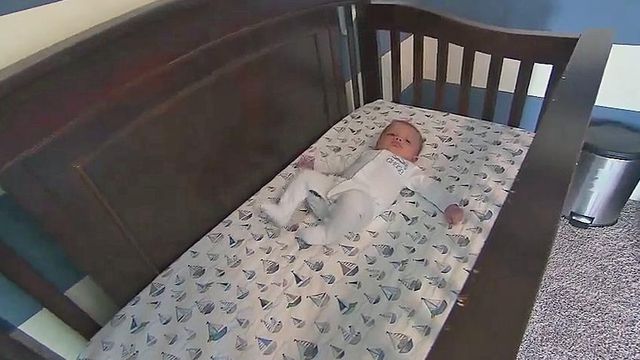Controversy surrounds when to start sleep training babies
Sleep training a baby. It is a hot topic among parents and professionals, but a well-known pediatric group is now recommending parents begin letting their infants learn to soothe themselves as early as 8 weeks old.
Posted — UpdatedDr. Michel Cohen, founder of Tribeca Pediatrics in New York City and author of several sleep coaching books, tells patients at his practice it is most effective and healthiest to let babies cry it out.
"It sounds horrible, but it is very successful," he said. "We have a lot of experience with it. It takes like two to three nights. It is pretty rough. I make it a point that it is not for everyone."
The guidelines involve establishing a nighttime routine, putting infants to bed at a reasonable hour, then checking on them at 7 a.m. the next day.
There will be crying, Cohen warns, but typically babies sleep soundly for about 10 to 12 hours straight within three nights.
"You don't know how many parents I have who come two years later and say sleep training was the best thing they have every done," Cohen said.
Most pediatricians recommend waiting until a baby is 4 to 6 months old before trying to sleep train.
Dr. Christian Nechyba with Carolina Kids Pediatrics agrees.
"Many babies don't develop the ability to soothe or settle themselves easily until 3 to 4 months of age," Nechyba said.
Still, he encourages parents to sleep train babies by 6 months.
Julia Rodriquez has three boys - the youngest, Indiana, is 6 months old.
"He is up every three hours, I still nurse him about every three hours," she said.
She began sleep training her older boys when they turned 1.
"I would let them cry for maybe 10 or 15 minutes, which feels like forever to hear a child cry, that's why I couldn't do it to a little baby," Rodriquez said.
Danielle Pennington echoed that sentiment. She said she is not ready to sleep train, and neither is her 2-month old.
"You piece together what you can from every study or whatever, but really at the end of the day it's survivalism," Pennington said.
Cohen said the guidelines apply to babies whether they are breastfed or formula-fed. He said it is a matter of teaching the baby to sleep through hunger, as adults do, and put themselves back to sleep.
• Credits
Copyright 2024 by Capitol Broadcasting Company. All rights reserved. This material may not be published, broadcast, rewritten or redistributed.





